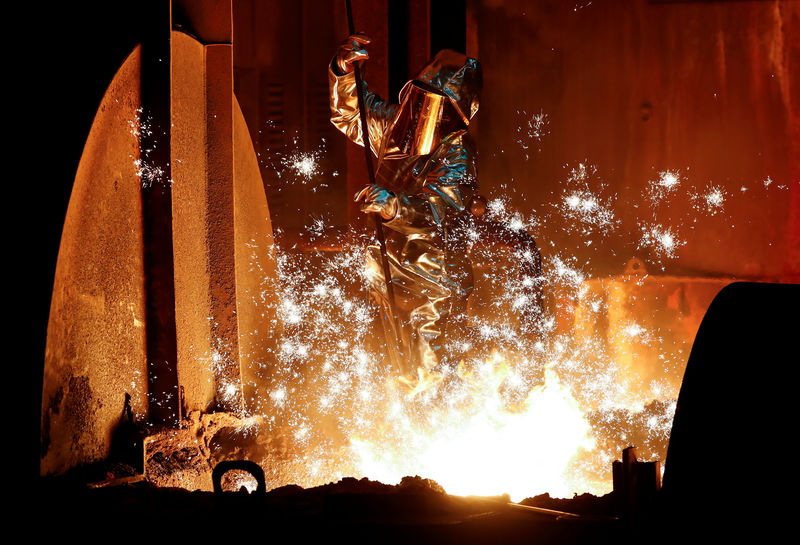By Barbara Lewis and Eric Onstad
LONDON (Reuters) - Steelmakers in Europe have been hit by falling demand and rising supply as auto-sector consumption has fallen and U.S. steel tariffs have disrupted shipments.
Britain's second biggest steel producer British Steel, which collapsed in May, is a high-profile casualty.
Days later, the world's biggest steelmaker ArcelorMittal cut European production for a second time in a month.
Industry leaders meet on June 26 in Brussels to assess what next.
The following addresses some of the questions.
WHY IS EUROPEAN STEEL IN CRISIS?
Higher raw material prices have squeezed steelmakers' profit margins. A Vale dam collapse in Brazil in January led to reduced iron ore output, needed for steelmaking, fuelling a doubling of iron ore prices over the last 12 months, while coking coal is about 10% more expensive.
At the same time, steel rebar prices on the London Metal Exchange have shed more than a fifth and steel company shares in May sank to their lowest since 2016. EU steel output is also down, slipping by 4% in April.
Meanwhile, Washington's 25% import tariffs have effectively closed the U.S. market, pushing steel shipments to Europe. Despite EU safeguard measures designed to prevent excess shipments from abroad, imports accounted for 10% of the EU market in 2018, double the share the year before.
GRAPHIC: European Steelmakers Squeezed - https://tmsnrt.rs/2ImCN8B
WHO'S DOING WELL, BADLY?
The collapse of British Steel is an extreme example of the impact of the European steel crisis.
The company's liquidation in May followed the combination of higher input costs and a miscalculation on the EU carbon market.
Analysts say the uncertainty surrounding Britain's departure from the European Union aggravated the misfortunes of British Steel, which relied on the EU for 70% of its sales. European rivals are better placed to supply for instance Germany's car manufacturers.
The Official Receiver has said it is working with "interested parties to explore how to preserve the company as a going concern". A mid-June deadline for firm bids has been extended until at least the end of the month.
Moody's ratings agency lowered its outlook on the European steel industry in May to negative from stable citing poor demand, high imports and falling steel prices.
Analysts say, however, ArcelorMittal has a strong balance sheet and its global reach means it is well-placed to benefit from any wider recovery in steel demand and any strengthening of EU measures to counter imports.
Austria's Voestalpine is insulated from the steel cycle by its high-end product portfolio sold on long-term contracts.
WHAT CAN EUROPE DO?
The European Commission, the EU executive, is reviewing its safeguard measures designed to counter the U.S. tariffs.
Quotas are set at the average level of imports in 2015-2017 plus 5%, with further 5% hikes envisaged on July 1 and a year later. Beyond these quotas, 25% tariffs apply.
The industry says tougher steps are needed. It says the U.S. tariffs have pushed more steel into Europe, especially from Turkey, which has overtaken China as the EU's biggest foreign steel supplier.
ArcelorMittal in an emailed statement said market conditions were "incredibly challenging".
"The unfortunate reality is the EU safeguard measures have not proved effective in countering a re-direction of trade flows as a result of the Section 232 tariffs introduced in the U.S., and urgently need strengthening," a company spokesman said.
GRAPHIC: EU Steel Imports fromTurkey Overtake China's - https://tmsnrt.rs/2InxUw0
STRATEGIC INDUSTRY?
The British government has so far stopped short of a clear industrial strategy.
The European Commission has said steel is a strategic industry, but some industry representatives question whether the Commission is doing enough.
Its decision in June to block Thyssenkrupp's and Tata Steel's plan to form a landmark joint venture, has deprived the sector of the consolidation many analysts say is essential to survival. The Commission was concerned the deal would have pushed up prices and reduced competition.
